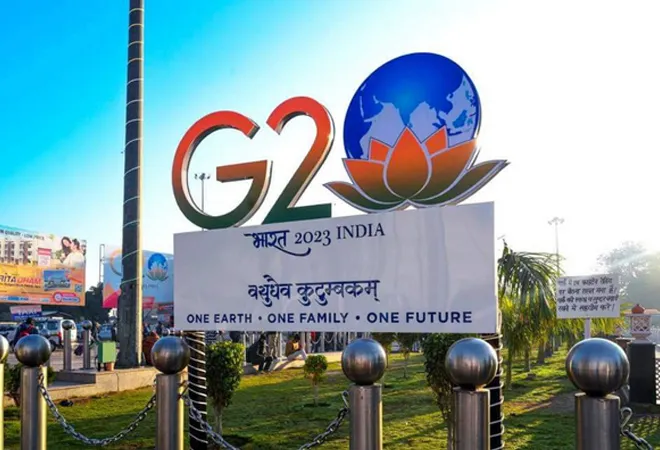-
CENTRES
Progammes & Centres
Location
India’s G20 presidency has a chance to build a well-equipped global health architecture to effectively deal with future health emergencies

Science rose to the occasion, but humanity didn’t—this is the epitaph the Global South would write on the tombstone of COVID-19. Dark as it may sound, this sums up the lived experience of innovation during the pandemic for people in most low-income countries, where death rates for COVID-19 patients were double their counterparts in the rich nations in respective age groups. Elsewhere in rich nations, vaccines were piling up in storage rooms, inching towards expiry and sooner rather than later, leaders would be deliberating on how to destroy drugs that have gone unused. For most low-income nations, COVID vaccines didn’t translate into vaccinations for them; life-saving innovations didn’t translate into lives saved. For this man-made disaster to be averted, some rules needed to be broken and some need to be birthed. The biggest lesson is that innovations in technologies, i.e., diagnostics, vaccines, and therapeutics, are critical during health emergencies but not sufficient.
G20, under India’s presidency, is prioritising most if not all of these issues under the health track as it deliberates a global health architecture for pandemic preparedness. Would other countries agree?
Innovations in multilateral arrangements need to go hand-in-hand with innovations in science. This is primarily for two reasons—first, for incremental innovations to multiply and be adapted to varied contexts in an emergency; second, for life-saving innovations to reach as many people as they can. Rethinking intellectual property laws, clinical trials, international regulatory standards, and manufacturing of medicines, jabs, and diagnostics are some areas where we need global paradigm shifts to prepare for future health emergencies. G20, under India’s presidency, is prioritising most if not all of these issues under the health track as it deliberates a global health architecture for pandemic preparedness. Would other countries agree?
Innovating in a health crisis
Intellectual property rights and patents, in particular, by their very nature tend to promote innovation by giving exclusive rights and concentrating ideas and resources in a few hands so that such rewards become an incentive for others to innovate. But this inherent rationale clashes with the goals of innovation during a health crisis. It may work in normal times but becomes weak in a crisis like COVID-19, where the very objective of a life-saving innovation is for it to swiftly reach as many as possible.
In hindsight, what are the factors that truly spurred vaccine innovations during COVID-19? Foundational scientific work aside, the strong political will that translated into proactive policy support for pharma companies; government-led grants for research and developments which convinced the private sector that the governments had skin in the game; and government-led advance guarantees for procurement which meant assured business for the products-in-making proved to be much stronger triggers than the prospect of just owning a patent and commercialising it without knowing who will pay for it. The fundamental questions to be asked here are—had advance guarantees and other policy aids not been there, would the companies still have managed to take these innovations to people in such a short ? Also, when the governments were giving grants and making promises to procure, should the international leaders not have built-in clauses that ‘life-saving innovations’ should be made to reach as many people as possible and as quickly as possible?
The world needs to agree upon bolder breakthroughs to make sure that governments combine to incentivise innovations differently during future emergencies by establishing systems that reward wider proliferation of innovation, not systems like patenting that restrict the distribution of life-saving innovations.
Health crises like COVID-19 demand that world leaders reward innovations differently and not get stuck in the IP inertia, which becomes a trap rather than an innovation multiplier. Foreseeing where the world may be headed, efforts were made by India and South Africa in October 2020 for waiving patents at the World Trade Organisation (WTO), but the global agency acted too late and did too little. A much watered-down version of time-restricted patent relaxation came from the WTO in June 2022, by when the damage had been done. Not only did its action remains largely ineffective in current conditions, but the global agency also lost a chance to build an exemplary precedence for future health emergencies.
There are bodies like the Medicines Patent Pool, which cajole pharma companies to voluntarily share innovations, but in practice, they have had limited impact and rely too much on the mercy of Big Pharma. The world needs to agree upon bolder breakthroughs to make sure that governments combine to incentivise innovations differently during future emergencies by establishing systems that reward wider proliferation of innovation, not systems like patenting that restrict the distribution of life-saving innovations.
Global clinical trials register and harmonising quality standards
As the pandemic raged, there was a deluge of clinical trials to test whether existing drugs can be repurposed or whether new drugs helped prevent or treat COVID-19. Many of them were published as ‘pre-prints’ that changed the rules of research. While this meant research output at a speed and volume never seen before, it turned out that the quality of many of these studies was suspect and could have resulted in more harm than good if used as interventions. About only 5 percent of COVID-19 trial arms were randomised and adequately powered (which means enough subjects were not recruited for trials).
In such cases, it becomes difficult to conclude whether the drug being tested is indeed safe and efficacious. There was an enormous amount of duplication in trials as well. This means a colossal amount of time and resources were being spent on testing the same drug for the same condition at different places, which could have been prevented if all trials were registered in a single global registry.
Many developed countries had huge mistrust in vaccines developed in a few developing countries, undermining the trust of people in those products and leading to less efficient use of innovations.
To be fair, the World Health Organisation (WHO) and other agencies run such registries but the struggle around breaching privacy and other challenges has stalled their progress. A pandemic-prepared future means when an outbreak occurs, clinical trials should follow a standard master protocol and the results of every clinical trial should become available in one database so that every country can learn from each other’s mistakes. This would help humanity reach the finishing line of innovation faster, significantly reducing medical experiments needed on humans.
Even after vaccines were discovered, many developed countries had huge mistrust in vaccines developed in a few developing countries, undermining the trust of people in those products and leading to less efficient use of innovations. If global regulatory standards can be harmonised, quality, regulatory, and trust issues can be significantly reduced during a health crisis.
Diversifying R&D and manufacturing hubs
The COVID-19 experience taught us that depending on charity or moral imperative as envisaged by COVAX—a global initiative floated amidst the pandemic with the mandate to promote vaccine equity—is not adequate to ensure that innovations reach vulnerable populations in the Global South during a crisis.
India’s Health Minister, Mansukh Mandaviya, who is leading the health track in the ongoing G20 deliberations has recently proposed that the Access to COVID-19 Tools (ACT) Accelerator—a global collaboration of UN agencies, governments, businesses, and not-for-profit organisations formed to develop, produce, and distribute COVID-19 tests, treatments, and vaccines—should expand its scope beyond COVID-19 to address other healthcare challenges by getting more legal teeth and a clearer accountability structure. He also called upon the G-20 leaders to support diversifying Vaccine-Therapeutics-Diagnostics Networks so that supply chain issues do not mar access to medical essentials during crises.
Clearly, the Global South should build its own research and manufacturing hubs as part of a larger global health architecture, so that those countries deprived of fruits of innovations this time will have the capacity and well-oiled channels to access them during the next crisis. This makes perfect sense given 69 percent of COVID-19 vaccine developers were located in high-income countries. At times, this skewed innovation geography means that innovations like m-RNA vaccines, which needed to be distributed in sub-zero temperatures, are ill-suited to fragile health systems in countries of the Global South.
The Global South should build its own research and manufacturing hubs as part of a larger global health architecture, so that those countries deprived of fruits of innovations this time will have the capacity and well-oiled channels to access them during the next crisis.
This would prove challenging, considering how secretive Big Pharma has been around COVID-19 vaccine development and how reluctant they are about transferring technologies to any initiatives in Global South. India, however, is uniquely suited to lead these global deliberations. One of the largest makers of medicines and vaccines in the world, with a record of slashing prices of life-saving drugs and a major manufacturing hub of COVID-19 vaccines, the country has the clout to be heard on global fora like the G20 when it speaks of shifting paradigms in the healthcare ecosystem.
Just like Big Pharma are answerable to their shareholders, global leaders need clear metrics to assess their success on investments they make in innovations as part of their multilateral duties. These indicators of collective success should measure how many people could have benefited from life-saving innovations versus how many really did. This will hold the leaders accountable as they are the ones who take world-shaping decisions on behalf of humanity. It could probably also mean that when humanity mounts its relay-race-like response to face the next pandemic, the outstretched hand of the Global South doesn’t remain waiting and empty.
The views expressed above belong to the author(s). ORF research and analyses now available on Telegram! Click here to access our curated content — blogs, longforms and interviews.

Dr Nitya Mohan Khemka is Director at PATH- a global Health think-tank focussing on health equity. She is also Trustee of the Khemka Foundation, an ...
Read More +
Soma Das is a senior advisor to Chase India and also advises projects of UN agencies not-for-profits and social enterprises. Soma has been a business ...
Read More +